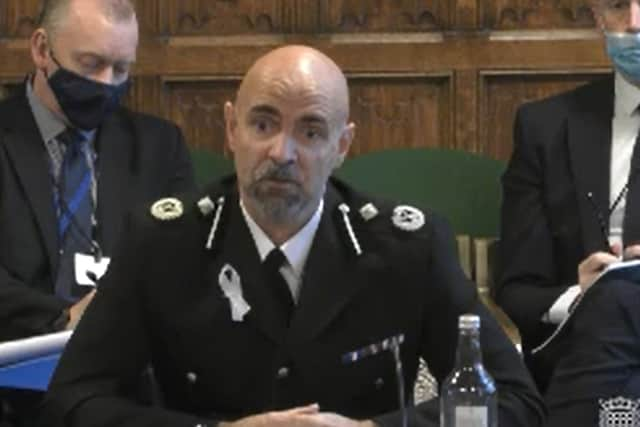Police drugs lead calls for spiking to become standalone offence - so it can be properly recorded
This article contains affiliate links. We may earn a small commission on items purchased through this article, but that does not affect our editorial judgement.
and live on Freeview channel 276
The drugs lead for the National Police Chiefs Council (NPCC) has told MPs he wants spiking to become a standalone offence - as there is currently a gap in the law affecting true-to-scale reporting.
Deputy Chief Constable Jason Harwin, the NPCC’s lead for drugs, gave evidence at the Home Affairs Committee inquiry into spiking on 26 January - with other police representatives - amid a wave of concern young people are being assaulted on nights out.


Advertisement
Hide AdAdvertisement
Hide AdMr Harwin revealed 1,382 people in the UK have reported spiking by needle since September to this week - with a small number of those cases leading to a secondary offence including theft-related robbery and sexual offences.
The deputy chief constable appealed for changes to the law to be made as police are struggling to clearly report spiking incidents on their systems, which inhibits accurate data collection.
This is because crimes are categorised by officers by primary or secondary offences.
Secondary offences are normally those with the most severe maximum sentences in law – or, after conviction, those the judge gives the most severe punishments for.
Advertisement
Hide AdAdvertisement
Hide AdFor example, if a perpetrator who is charged both with spiking an individual and for committing a more serious offence such as rape - the crime would be recorded under the secondary crime.
Also, spiking crimes can be categorised under different laws too, such as Offences Against the Person Act 1861 and the Sexual Offences Act 2003 - adding to more confusion.


New spiking offence needed for accurate reporting
Mr Harwin said: “In the longer term, in my personal view, we need a separate offence for [spiking] because it highlights the importance of this crime.
“Secondly, for me, importantly, it shows the importance of doing everything we can to stop it in the first place.”
Advertisement
Hide AdAdvertisement
Hide AdHe added that there’s more investigation capacity for spiking incidents which have turned into a secondary offence because police already have established protocols.
Dean Ames, Forensic Drug Operations Manager for the Met Police, said the “vast majority” of secondary offences are sexually motivated.
He said: “When forensic toxicology analysis is undertaken the vast majority of samples detect alcohol in the victim, not drugs. It’s probably around less than 10% of actual samples actually detect an additional actual drug.”
‘Gap in the law’
Richard Graham presented his Spiking (Offence) Bill to the House of Commons on Wednesday (26 January), arguing that creating a new offence for spiking would send a “clear message” to those who think that it is “fun”.
Advertisement
Hide AdAdvertisement
Hide AdThe MP for Gloucester insisted there is a “gap in the law” at the moment, as while there are laws that can be used to prosecute spiking, such as the Offences Against the Person Act 1861 and the Sexual Offences Act 2003, there is “so much” that it is not covered in those.
He explained: “There is much in-between that is not covered, especially when it is not clear or cannot be proved what the purpose of spiking was or whether drug use can’t be identified, including because its effects were already worn off.”
Mr Graham said: “Our aim in this House as always is to protect our young and reassure the public.
“We can also send a clear message above all to those who think that spiking is fun. It is not.
Advertisement
Hide AdAdvertisement
Hide Ad“Spiking has a deeply unpleasant impact on many lives and it is, I argue, a crime that should be punishable in its own right.”
Victims or witnesses of spiking can share their experiences through the Home Affair Committee’s public survey, which is open until January 31.
A message from the editor:
Thank you for reading. NationalWorld is a new national news brand, produced by a team of journalists, editors, video producers and designers who live and work across the UK. Find out more about who’s who in the team, and our editorial values. We want to start a community among our readers, so please follow us on Facebook, Twitter and Instagram, and keep the conversation going. You can also sign up to our newsletters and get a curated selection of our best reads to your inbox every day.
